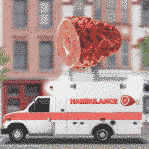|
Hmm, what does that mean exactly? If effectiveness drops that much in 6 months, is the idea that you'd need a booster every 6 months to stay protected?
|
|
|
|

|
| # ? Jun 7, 2024 22:35 |
|
A booster may provide both stronger and longer lasting immunity. Your immune system reacts dofferently to multiple exposures. But who knows.
|
|
|
|
Junctioning Ultima to your Elem-Def raises your vaccine effectiveness
|
|
|
|
It desperately needs to be determined if a J&J shot still has a significant impact on reducing severity of illness or spread after six months, really. Or the "my natural antibodies" fuckers would be legally correct, there may be no substantial basis for treating people with one J&J shot as vaccinated. It also really makes you wonder about this mix-and-match data that was being billed as controversial earlier in the week if J&J just plain doesn't work anymore after 6 months and the only thing demonstrated is that mRNA vaccines are good. All of these vaccines were studied contrary to the scientific method, really, they had in place all the variables such as closures, mask mandates, no large events, participants last year were probably washing their hands more than people now. And that's not even concerning variants.
|
|
|
|
wait are we all hosed again what is,
|
|
|
|
Pinecone Sample posted:It desperately needs to be determined if a J&J shot still has a significant impact on reducing severity of illness or spread after six months, really. Or the "my natural antibodies" fuckers would be legally correct, there may be no substantial basis for treating people with one J&J shot as vaccinated. Pfizer going from 91 to 50 in 6 months isn't super encouraging either, to be honest. Is 50% considered good enough protection? I mean it's better than 3 obviously.
|
|
|
|
We've seen lower out of Pfizer in the field (Texas prison Delta outbreak paper) too
|
|
|
|
A Strange Aeon posted:Pfizer going from 91 to 50 in 6 months isn't super encouraging either, to be honest. Is 50% considered good enough protection? I mean it's better than 3 obviously. The U.S. line is to stop worrying about breakthrough infections and look at the protection from severe* disease and hospitalization. The Israeli line is that all infection is bad, the primary series is not enough at this point, and everyone needs another shot after five months. e: Oh yeah Iím supposed to put the footnote here. *ďSevereĒ has a technical definition that does not align with what any lay person considers to be severe. You can be hardly able to leave your bed for days and never have ďsevereĒ disease. Platystemon fucked around with this message at 23:03 on Oct 17, 2021 |
|
|
|
Boosters seem to restore similar levels of protection. If it's longer lasting too (which seems likely but far from guaranteed) that'd be great, if not I'll happily take one every 6 months until we develop something better. Hopefully it'll be enough to keep pushing numbers down. They keep declining in my state but it's at a slowing pace.
|
|
|
|
A Strange Aeon posted:Pfizer going from 91 to 50 in 6 months isn't super encouraging either, to be honest. Is 50% considered good enough protection? I mean it's better than 3 obviously. Keep in mind that the study in question only measured antibody levels, which is far from telling the whole story when it comes to immune response. Simpson's Paradox may also be playing a big role here; the study only used 2 age groups (18--55 and >55)
|
|
|
|
This VA study was looking at documented breakthrough infections which seems like firmer data. I imagine JnJ will continue to have a role but it should almost certianly be a 2 shot deal at least.
|
|
|
|
Pookah posted:Not really, it's mostly pretty rural, and the largest town (sorry CITY) has a population of around 53,000. I just looked up a couple of news reports on it, and the current thinking is that there isn't any one cause, it's a mixture of people getting lax about masks/distancing, mixing more, plus kids back at school. The reason I ask is we're seeing a weirdly counterintuitive thing with case rates in England (and to a slightly lesser extent in Wales and Scotland, but not at all in NI) where case rates are low, and dropping, in the very densely populated areas, while rates are high and rising in the suburbs and rural areas. For example, the 5 most densely-populated local authorities in England: LA: cases per 100k Population density (last 7 days) (people per sq. km.) Islington: 168 16097 Tower Hamlets: 186 16057 Hackney: 163 14681 K&C: 202 12884 Lambeth: 178 12157 For context Hackney's case rate is the sixth-lowest *in the entire country*, and is lower than anywhere with a population over 10k. Also these are all London boroughs, so probably the majority of people in these boroughs are getting some form of public transport, and all of them have a case rate in the bottom 10%. Meanwhile the suburbs aren't doing too well at all - Richmond and Hounslow, 28th and 30th least-dense of the 32 London boroughs, are neck-and-neck with 401 cases per 100,000 for the last 7 days. Birmingham, Liverpool and Manchester are showing a similar pattern, with the densely-populated areas in the centre with lower case rates and higher case rates in the suburbs (although the numbers are less clear because their boroughs tend to mix inner- and outer-city areas much more than London does). Conversely the highest case rates are: LA: cases per 100k Population density (last 7 days) (people per sq. km.) Wellingborough: 834 487 Ipswich: 786 3480[1] Torfaen: 774 740[2] Trafford: 750 2229[1] Cardiff: 740 2500[2] [1] Ipswich and Trafford are both examples of what I was mentioning about the inner- and outer-city being mixed in the numbers, but I can't drill down any further. Trafford is a *massive* outlier for Greater Manchester though - the other 6 areas in Greater Manchester ranging from 268 to 360, and also has by far the lowest population density. [2] These are both in Wales so numbers may not be directly comparable due to differences in both testing and NPI policy. It's not a matter of different testing regimes either - in fact the test positivity rates for the inner London boroughs are all around 3%, while Wellingborough is an eye-watering 15% and climbing. Hospitalisations and deaths are still holding steady - in fact are falling sharply in London (20% in the last month) and the North West (10%) which are the two most-populous regions, and holding steady in the West Midlands, the next. What does it all mean? Who knows. Generally speaking the more densely populated an area the younger the population of course, so that might be a factor, vaccination rates are now pretty uniform across the country, at least anywhere built-up, and upswings in cases followed this exact same pattern in March and December last year - cities first, then the suburbs, then the exurbs - which makes sense, but it doesn't make sense for downturns to happen the same way *unless* the Thing That We Don't Talk About Any More (herd immunity) is actually starting to have an effect.
|
|
|
|
naem posted:wait are we all hosed again what is, 
|
|
|
|
HD DAD posted:Junctioning Ultima to your Elem-Def raises your vaccine effectiveness And what if I junction myself... unto SARS-CoV-2?
|
|
|
|
goddamnedtwisto posted:The reason I ask is we're seeing a weirdly counterintuitive thing with case rates in England (and to a slightly lesser extent in Wales and Scotland, but not at all in NI) where case rates are low, and dropping, in the very densely populated areas, while rates are high and rising in the suburbs and rural areas. For example, the 5 most densely-populated local authorities in England: Isn't it mostly that the boroughs with low case rates skew younger populations who only became "fully vaxxed" in the last 2-3 months, while the more rural locations skew older and have been fully vaxxed for 6+ months, meaning the protection is waining leading to more infections? I remember with Tower Hamlets specifically their vaxx distribution numbers lagged behind other boroughs for quite a while because of their comparatively younger population...
|
|
|
|
Is there any reason I shouldn't just lie to CVS and get Moderna on top of Pfizer.? Is there a secret phrase I can tell my doctor to finally make them give me the pneumonia vaccine I've always wanted? (I'm 37) I want ALL the vaccines.
|
|
|
|
Beachcomber posted:Is there any reason I shouldn't just lie to CVS and get Moderna on top of Pfizer.? Is there a secret phrase I can tell my doctor to finally make them give me the pneumonia vaccine I've always wanted? (I'm 37) I wish this country wasn't so broken because I'd sign up for a study to straight up inject me with Moderna, Pfizer, Janssen, AZ, Sputnik WITH ACTIVE ADENOVIRUS and Sinovax
|
|
|
|
blunt posted:Isn't it mostly that the boroughs with low case rates skew younger populations who only became "fully vaxxed" in the last 2-3 months, while the more rural locations skew older and have been fully vaxxed for 6+ months, meaning the protection is waining leading to more infections? Well that is one possible factor I considered - I mentioned that generally the denser the area, the younger the population, which would track both with that possibility and also just with the fact that younger adults are less likely to have symptoms and get tested. Conversely, my unimpeachable anecdata of people at least in Tower Hamlets and surrounding areas is that young people are way, way less likely to be masking and distancing. I probably have to get all of this into a spreadsheet and do some proper crunching, because once you take London out of the equation the association gets much less strong, but it still seems like *something* is happening.
|
|
|
|
Beachcomber posted:Is there any reason I shouldn't just lie to CVS and get Moderna on top of Pfizer.? Is there a secret phrase I can tell my doctor to finally make them give me the pneumonia vaccine I've always wanted? (I'm 37) The pneumonia vaccines (the 13 and the 23) are normally for people 65+ or adults that are immuno-compromised or at high risk of respiratory problems. I don't think pharmacies normally do those so you probably can't pull a Max Titers on them, and an actual doctor's office is going to know your status presumably. Though I think nominally active-smoker counts, so maybe you could talk them into it if you claimed former smoker, but not sure you'd want that on your actual medical records if it isn't true.
|
|
|
|
Rescue Toaster posted:The pneumonia vaccines (the 13 and the 23) are normally for people 65+ or adults that are immuno-compromised or at high risk of respiratory problems. I don't think pharmacies normally do those so you probably can't pull a Max Titers on them, and an actual doctor's office is going to know your status presumably. Though I think nominally active-smoker counts, so maybe you could talk them into it if you claimed former smoker, but not sure you'd want that on your actual medical records if it isn't true. Always had breathing issues, and my grandmother died of pneumonia. It freaks me out and I don't really know what the downside of getting a vaccine would be? Doesn't my health insurance have a vested interest in keeping me healthy? I'd take polio if I could.
|
|
|
|
Beachcomber posted:Always had breathing issues, and my grandmother died of pneumonia. It freaks me out and I don't really know what the downside of getting a vaccine would be? Doesn't my health insurance have a vested interest in keeping me healthy? Pneumovax 23 is about $120-150 at pharmacies from what I can see, Prevnar 13 is more around $220. A Dr can certainly prescribe it 'off-label' depending on what your previous breathing issues were, especially if there's records of you being diagnosed or treated for things. You might have to pay out of pocket in the end if the insurance isn't convinced.
|
|
|
|
Going to seriously consider it.
|
|
|
|
lot of people getting pneumonia these days. must be something going around
|
|
|
|
goddamnedtwisto posted:The reason I ask is we're seeing a weirdly counterintuitive thing with case rates in England (and to a slightly lesser extent in Wales and Scotland, but not at all in NI) where case rates are low, and dropping, in the very densely populated areas, while rates are high and rising in the suburbs and rural areas. For example, the 5 most densely-populated local authorities in England: Weren't the cities hit first in each wave? I wonder if maybe London has already hit peak for this wave. The situation in schools here continues to absolutely suck. Parents had to set up a facebook group to keep themselves informed about where there were cases in schools, because it was clear from the start that our government was determined to push the narrative that covid doesn't spread in schools. I know, I know, facebook is a hive of misinformation, but this group has been extraordinarily cautious about not posting about a school until they have absolute proof in the form of an announcement sent to a parent of a child in that school. Since vaccination was extended to everyone over 12, cases in secondary schools have dropped like a stone, but its absolutely burning through primary schools. I just read this morning about a school that's closing for the next few weeks because they have at least 30 cases and are expecting more (total number of students: about 200). They are furious with the government's decision not to contact trace in schools, and for instructing schools not to tell other parents about a positive case in their child's class. It's absolutely shameful. edit: letter from school 
Pookah fucked around with this message at 09:00 on Oct 18, 2021 |
|
|
|
Pookah posted:Weren't the cities hit first in each wave? I wonder if maybe London has already hit peak for this wave. Well that was the point I was making in the last paragraph, obviously *a* peak has been hit but there's no NPI or other external mechanism driving down cases in those areas. All previous downturns in cases have been driven by an increase in NPIs but this has not been the case in the last 4 months in England - in fact the exact opposite, what few NPIs that remained after "Freedom Day" have been removed or are being widely ignored. So something else is making cases drop off in London and the other big cities. Of course it's not *impossible* that what's actually happening is a new variant that isn't detected by existing tests and the lagging indicators (hospitalisation and death) are about to rocket, but that seems fairly unlikely given the fairly robust second-line testing and surveillance we still have in place. One thing that *has* occurred to me is that this cold that has ripped through the population in the last month might be the key - it's not impossible that a lot of people have been off work or otherwise out of circulation from it over some of that time, and the likelihood of catching it is some multiple of your risk of exposure to covid - this is effectively then a (not hugely effective, but with noticeable effects) NPI targeted on those who might otherwise be catching covid. I suppose the key is how things go as we get into November - if it is just some coincidental effect like that then we should see cases beginning to climb again, if they continue to drop (and of course hospitalisations and deaths do similar) while other areas continue to rise we can probably start using the magic words with a bit more confidence. Of course if it turns out that yes, inner London *has* hit herd immunity while cases rocket in the rest of the country, we hit an incredibly difficult decision for the government. What am I saying, it's not a decision at all, they'll let the entire rest of the country burn so they can all get their treats at Christmas.
|
|
|
|
goddamnedtwisto posted:One thing that *has* occurred to me is that this cold that has ripped through the population in the last month might be the key - it's not impossible that a lot of people have been off work or otherwise out of circulation from it over some of that time, and the likelihood of catching it is some multiple of your risk of exposure to covid - this is effectively then a (not hugely effective, but with noticeable effects) NPI targeted on those who might otherwise be catching covid. It's a valid hypothesis. It was observed in some Swedish cities during May and June that, as RSV and rhinoviruses hit daycares and schools, Covid cases went down sharply. Their conclusion was that likely Covid-19 was (at least temporarily) out-competed. I would bet that this mechanism could work in any society where there is generous paid medical leave combined with broad public rejection of "coming to work or school with symptoms".
|
|
|
|
binge crotching posted:How do you have a -7% to +12% effectiveness?
|
|
|
|
https://www.bbc.com/news/world-us-canada-58957273 Former US Secretary of State Colin Powell has died aged 84 of Covid-19 complications, his family has announced.
|
|
|
|
ShadowHawk posted:By using a naive normal distribution confidence interval rather than something that assumes a prior like "probability is not negative" It's not a probability though, it's a measure of effectiveness, and it's perfectly possible (medically and statistically) for a vaccine to have negative effectiveness - if 1% of your control group and 1.07% of your vaccinated group get ill then it has a -7% efficacy. You can even point at real-world examples like the Cutter polio vaccine where the vaccine actually *caused* the illness, and the various cases where interactions between vaccines and later infections can cause more serious illness. I think (with the obvious disclaimer that immunology is a bitch) it would be fairly difficult for a formerly-effective vaccine to drop to a negative efficacy but it's still not impossible, that latter effect (antibody-enhanced disease) is a known issue with the dengue fever vaccine, for example. So it's not impossible that J&J could actually have a negative effectiveness after 6 months, although it is extremely unlikely.
|
|
|
|
ephex posted:https://www.bbc.com/news/world-us-canada-58957273 He's lying about Iraqi WMDs with the angels now
|
|
|
|
ephex posted:https://www.bbc.com/news/world-us-canada-58957273 Ironically, Colin Powell provides real evidence and conservatives refuse to believe it!
|
|
|
|
goddamnedtwisto posted:It's not a probability though, it's a measure of effectiveness, and it's perfectly possible (medically and statistically) for a vaccine to have negative effectiveness - if 1% of your control group and 1.07% of your vaccinated group get ill then it has a -7% efficacy. You can even point at real-world examples like the Cutter polio vaccine where the vaccine actually *caused* the illness, and the various cases where interactions between vaccines and later infections can cause more serious illness. All that aside, itís still an estimate so it will have a sampling distribution associated with it. Their CI shows that hazard ratios of both < 1 and > 1 fall within the confidence region, meaning they have no evidence at all for the effectiveness of J+J at that time despite their point estimate of 3%. I didnít read the paper so Iím not sure if they were careful to make that point.
|
|
|
|
Crackbone posted:Ironically, Colin Powell provides real evidence and conservatives refuse to believe it! Nah, anti-vax shitheads are going to zero in on the fact that he died despite being fully vaccinated. They'll conveniently neglect to mention that besides being old as hell, he was also in treatment for multiple myeloma (blood cancer).
|
|
|
|
Rescue Toaster posted:Pneumovax 23 is about $120-150 at pharmacies from what I can see, Prevnar 13 is more around $220. A Dr can certainly prescribe it 'off-label' depending on what your previous breathing issues were, especially if there's records of you being diagnosed or treated for things. You might have to pay out of pocket in the end if the insurance isn't convinced. I think these vaccines only protect against pneumococcal pneumonia (bacterial, not viral), but you should talk to your doctor first to see what they suggest.
|
|
|
|
The Hambulance posted:I got my Pfizer booster today. The first two vaccinations didnít give me any side effects, so Iím hoping for an easy time. I'm happy to report that I had no side effects from the third Pfizer shot, other than soreness at the injection site and some very mild fatigue on Saturday.
|
|
|
|
Same. My injection site was kinda red and swollen but I had no sickness, etc. A++, would (and likely will) vax again. Got mine on Thursday btw. I can still feel a firm spot (probably microchips) but that's all.
|
|
|
|
Got my third shot today. Also got the pharmacist to fill out a new card for me since I screwed up by having the old one laminated(and it clearly damaged the stickers the mass vaccination site used for lot numbers). I got pretty tired/feverish from my second shot, we'll see if the third is better or worse.
|
|
|
|
|
dwarf74 posted:Same. My injection site was kinda red and swollen but I had no sickness, etc. For a different perspective I didn't have any significant effects from shots one or two but three gave me an actual fever (low 100.4) which is the first time I've ever had a fever to my knowledge. I don't know if it was because I had my flu shot the week before so my immune system was already wound up or what. Ultimately I think it's pretty random what kind of side effects you get.
|
|
|
|
7of7 posted:For a different perspective I didn't have any significant effects from shots one or two but three gave me an actual fever (low 100.4) which is the first time I've ever had a fever to my knowledge. I don't know if it was because I had my flu shot the week before so my immune system was already wound up or what. Same here, both the fever (101 for me) and the flu shot about a week prior.
|
|
|
|

|
| # ? Jun 7, 2024 22:35 |
|
The CVS and Walgreens online scheduling hasn't been updated yet for Moderna CDC recommendations. My wife and I got our second Moderna shot the first week of March so we are far enough out to qualify hopefully. I hate to just walk in and try to get a shot because the locations near us are always busy and I hate to waste their time if they aren't allowed to do it yet.
|
|
|

















































